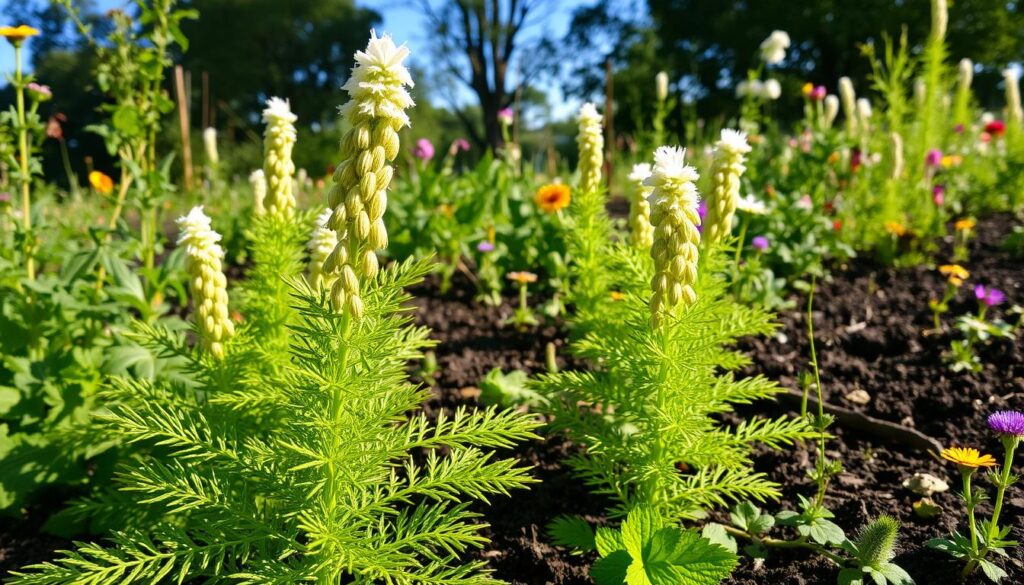Ever thought about the secret powers of mugwort? This simple herb, known as Artemisia vulgaris, has been a key part of traditional medicine for ages. Could it be the answer to natural pain relief?
Mugwort, a hardy perennial from Europe, Asia, and North Africa, has been used for centuries. It’s known for its natural pain relief, inflammation, and more. Explore mugwort’s world and see how it could change your pain management.
Key Takeaways:
- Mugwort has been traditionally used to treat conditions like osteoarthritis, digestive issues, menstrual cramps, and even cancer.
- Moxibustion, a technique involving burning mugwort, has shown evidence of effectiveness in reducing pain and managing symptoms in osteoarthritis patients.
- Limited research suggests that mugwort may help relax the uterus, induce late menstrual cycles, and relieve associated cramps.
- Mugwort may also have potential in reducing the frequency and severity of hot flashes in menopausal women.
- While mugwort offers many medicinal benefits, it can also pose risks, such as allergic reactions and potential liver, kidney, and heart issues if not used properly.
Unveiling Mugwort’s Medicinal Marvels
Mugwort is known for its strong anti-inflammatory properties. Research shows that its active parts, like sesquiterpene lactones and essential oils, can lessen inflammation and swelling. This makes mugwort a great topical herbal remedy for skin issues, joint pain, and muscle aches.
Mugwort also has analgesic (pain-relieving) properties. It’s a natural way to manage pain. Its ability to fight inflammation and relieve pain makes mugwort a good choice for those looking for a botanical analgesic.
Anti-inflammatory Properties
The anti-inflammatory properties of mugwort are well-studied. It can reduce swelling and redness in various inflammatory conditions. This makes it a promising topical herbal remedy for skin irritations, joint pain, and muscle aches.
Pain Relief Benefits
Mugwort also has analgesic (pain-relieving) properties. It’s a valuable natural pain management option for managing chronic or acute pain. It’s a good choice for those looking into botanical analgesics and traditional medicine.
“Mugwort’s versatility in providing both anti-inflammatory and pain-relieving benefits makes it a compelling choice for natural pain management.”
Harnessing Mugwort’s Aromatic Charm
Mugwort is not just good for health; it also has a lovely scent. This scent can make any room feel calm and peaceful. The smell is earthy and a bit bitter, perfect for making natural potpourri.
The essential oils in mugwort are great for aromatherapy. They help you relax and feel less stressed. Using mugwort in your daily life can improve your mood and well-being.
Natural Potpourri
Making mugwort potpourri is easy and fun. Just dry the leaves and flowers, then put them in a bowl or sachet. Over time, your home will smell wonderful, like a field of herbs.
Aromatherapy Benefits
Mugwort’s essential oils are calming and help with stress. They can make you feel less anxious and help you sleep better. You can use them in a diffuser or in air fresheners.
“Mugwort’s distinctive earthy and slightly bittersweet scent can transport you to a peaceful, meditative state, making it a valuable addition to your self-care routine.”
Using mugwort’s scent can make your home feel better. It’s good for both your senses and your health. From potpourri to aromatherapy, mugwort can make your life more enjoyable and peaceful.
Mugwort: Nature’s Topical Pain Relief Solution
Mugwort is great for natural pain relief. It helps with inflammation and discomfort from different conditions. It’s good for joint pain, muscle aches, and skin irritations.
It uses the plant’s anti-inflammatory and analgesic powers. This makes it a soft but strong way to handle pain. It’s a natural choice for pain management.
A 2017 study showed mugwort works well as a botanical analgesic. It found mugwort helps with many pain types, like neuropathic and chronic pain.
Research in 2013 also supports mugwort. It found mugwort’s compounds help reduce pain and inflammation. This makes it a good option for natural pain management.
Mugwort is good for muscle soreness, joint pain, and skin issues. It’s a natural way to find relief. Adding mugwort to your routine can help with holistic healing and alternative therapies for pain.

“Mugwort has been used for centuries in traditional medicine to address a wide range of ailments, including pain and inflammation. Its natural analgesic properties make it a compelling choice for those seeking a gentler, more holistic approach to pain management.”
Practical Perks of Mugwort
Mugwort is more than just a medicinal plant. It’s also great for your garden and kitchen. As a natural insect repellent, it keeps pests away. This makes it perfect for any eco-friendly outdoor space.
In the kitchen, mugwort adds flavor to many dishes. It’s especially good with fatty meats, fish, and poultry. This makes your meals more interesting and might even help with digestion.
Garden Guardian
Mugwort has been a natural pest control for centuries. Its scent keeps mosquitoes, aphids, and spider mites away. This helps your garden grow strong without harsh chemicals.
Using mugwort in your eco-friendly gardening makes your outdoor space healthier. It’s a smart choice for a greener garden.
Culinary Delights
In the kitchen, mugwort’s flavor is a big plus. It adds a unique taste to dishes, especially those with fatty meats, fish, and poultry. It’s a great way to make your meals more exciting.
By using mugwort, you make your home more sustainable and tasty. It’s good for you and your family.
| Practical Use | Benefits |
|---|---|
| Pest Control | Effective natural insect repellent, helps create eco-friendly gardens |
| Culinary Applications | Enhances flavor of fatty meats, fish, and poultry, provides digestive-enhancing properties |

“Embracing mugwort’s practical uses can help you create a more sustainable, nature-friendly, and delicious living environment.”
Conclusion
Mugwort’s journey from ancient times to today shows the lasting value of natural remedies. This herb is known for its strong anti-inflammatory and pain-relieving effects. It’s a great choice for those looking for natural ways to handle pain.
Mugwort is not just for medicine. It also smells great and is useful in gardens and kitchens. This makes it even more special.
More research is needed to fully understand mugwort’s benefits. But it’s already a great option for those wanting a natural way to manage pain. By using mugwort, you can take care of your body and the planet in a holistic way.
Exploring mugwort as a topical pain treatment and anti-inflammatory herb is exciting. It’s a chance to appreciate nature’s healing power. By adding mugwort to your life, you can enjoy the benefits of holistic healing and connect with nature more deeply.

